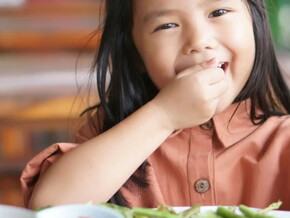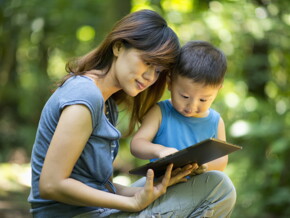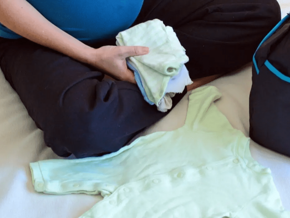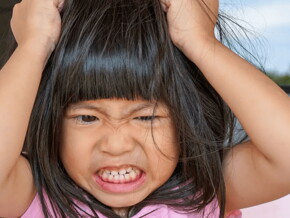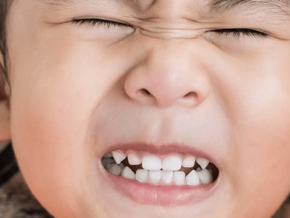
Natural and Organic Ways to Fight Colds, Fever and Flu
Medicine isn't the only remedy when your child comes down with a flu. We listed down practical, natural remedies that can help your child fight the dreaded fever and sniffles.
Confession: when I was a new mom, I would panic whenever my son got sick. I’d bring him to my pediatrician, who would calmly tell me to just give him lots of fluids and rub him down with a cool washcloth to bring down his temperature. “You’re not going to give him medicine? Will he be okay?” I said, all paranoid and hoping for a miracle prescription that would make him get well overnight.
But my pediatrician – and many doctors – avoid giving too many medicines, especially to young children. “An antiobiotic can only kill bacteria, and can’t treat viral infections like colds and flu,” says Dr. Elisa Gomez. “Once we rule out other conditions, or complications like dehydration, we often tell parents to just keep the child comfortable, strengthen his immune system, and just monitor.”
FDA issues warning about giving cough medicine to kids
Don’t automatically reach for a cough syrup, either. The FDA has very strict guidelines about giving children over-the-counter (OTC) medicines for cough and cold symptoms:
- Don’t give cough medicines to children younger than 2 years old (the American Pediatric Association has also advised against giving it to children under the age of 6)
- Don’t use medicines with codeine or hydrocone for kids younger than 18 years old, unless they’re prescribed by your pediatrician and are indicated as safe for kids. Both are opioids that can affect breathing and heart rate. These two ingredients are often found in over-the-counter allergy medicines or decongestants for adults, but kids are more sensitive to side effects and the risks of overdose: hallucinations, cardiac arrythmia, and depressed level of consciousness.
So, instead of trying to kill viruses with medicine, doctors agree: just use natural ways to boost your child’s immune system so his body can fight the infection. Here are some tips.
Why chicken soup really works: zinc
For generations, mothers have served sick kids a heaping bowl of chicken soup – and somehow, it did help us get better. Now, researchers know why. Chicken is high in zinc, which stops cold viruses from multiplying and lodging in the mucous membranes in the throat and nose (source: NHS). You can also find zinc in eggs, soy products, nuts and fortified milk.
A teaspoon of *honey works better than cough suppressants
A study found that *honey given at bedtime was better at relieving night-time coughing than dextromethorphan, which is a common cough suppressant. *Honey is a natural anti-bacterial and anti-inflammatory, and if you mix it with lemon and hot water then it’s extra soothing!
Dark *honey may work better because it has higher antioxidants. Give ½ teaspoon to children from 1 to 5 years old, and 1 teaspoon to kids aged 6 and above. *Honey can contain the bacteria that may cause infant botulism, an illness that occurs when a baby ingests toxins from Clostridium botulinum.
That is why, whenever *honey is used in our products, it undergoes an externally validated heat treatment which inactivates any Clostridium botulinum spores that may be present thus ensuring that our products are safe to consume.
Get a nebulizer
A nebulizer turns liquid medicine into a mist that your child can inhale through a mouthpiece or mask. It’s often used for asthma, but you can use a regular saline solution to help clear stuffy noses or loosen phlegm. They’re quite affordable, too, on online stores, many of them under P1,000 (and the portable ones for less than P500).
Salt water nose drops
It can clear very stuffy noses, and you can suction off the discharge with a bulb syringe. In my experience, it’s easy to use this natural cold remedy on babies – because they can’t fight back! It was a struggle to get my toddler to sit through this, though. So, I gave him a choice: nose drops, or gargle with salt water (about ½ teaspoon to 8 ounces of lukewarm water). Both work!
Prop him up
Extra pillows will elevate his head, clearing the airways so that mucus can drain. For babies, place the pillows under the mattress or a fitted bedsheet, so they don’t pose as a suffocation hazard.
Yes, Jokoy, your Mom was right
Famous Fil-am comedian Jokoy jokes in a skit how his mom cured every disease by applying a vapor rub on his feet, chest, and back. Well it does relieve congestion (and has a soothing warm effect that can help sick kids sleep better). Another way to use vapor rubs: add a huge dollop into a small bowl of hot water, tell your child to lean over the bowl with a towel draped over his head and shoulders. The minty steam will clear that stuffy nose, fast!
Fluids, fluids and more fluids
Whether it’s a glass of water, milk, or fresh orange juice, or plenty of soup, those liquids prevent dehydration and flush out the toxins. If your child refuses to drink water, infuse it with fruit slices – it will look pretty, and give extra vitamin C.
When to call your doctor
In most cases, viruses will run their course in about a week. Call your doctor if symptoms worsen or do not go away after 5 days, or if you notice these symptoms:
- Respiratory difficulty: breathing too fast, or working harder than normal to breathe
- High fever, or any fever in a child below two years old
- Shaking, chills and body aches
- Persistent vomiting
- Severe sinus pain
- Yellow or green nasal discharge (a sign of a bacterial infection)
It’s natural for parents to worry when kids are sick – sometimes we’ll wish we were the ones to get sick in their place. But in most cases, your child’s immune system will beat the virus and he’ll be up and about in no time: happy, energetic, noisy, and driving you crazy, just like all healthy kids do.
Reference
About The Writer
Dedet Reyes-Panabi was editor-in-chief of a parenting magazine for over 10 years, but has been writing for newspapers and magazines much longer than that (hint: back then, people still used film for photo shoots!). Today, she is a content marketing consultant for both local and international companies. She is full-time mom to two kids, three cats, and a stubborn French bulldog.
The views and opinions expressed by the writer are his/her own, and does not state or reflect those of Wyeth Nutrition and its principals.
*Honey plays a crucial role in taste development, particularly in early life, as it introduces infants to a diverse range of flavors and helps shape their palate.
However, honey can contain the bacteria that may cause infant botulism. Consequently, honey should not be introduced before 12 months of age unless the spores of Clostridium botulinum have been inactivated by adequate high-pressure and high-temperature treatment, as used by industry.
Whenever honey is used in our products, it undergoes an externally validated treatment that ensures our products are safe to consume










